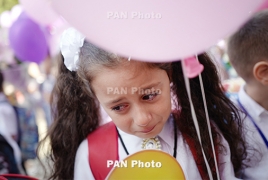
Gender stereotypes emerge early, and by age six, girls are less likely to believe females are "brilliant" and more likely to believe boys are, according to a study released Thursday, January 26, AFP says.
The report in the journal Science was based on 400 youths aged between five and seven, who were given a series of tasks.
In one, the kids were told a short story about a person who was "really, really smart," but were given no hints about whether the person was male or female.
At age five, both boys and girls were equally likely to choose their own gender as "really, really smart."
But by age six and seven, "girls were significantly less likely than boys to associate brilliance with their own gender," said the study.
In another part of the study, children had to guess which of four children, two boys and two girls, got the best grades in school.
In this case, both younger and older girls were just as likely to select girls as having top grades, suggesting that the "girls' perceptions of school achievement were separate from their perceptions of brilliance," said the report.
Finally, when the kids were asked about their interest in two new games, one for "children who are really, really smart" and the other for "children who try really, really hard," researchers found that girls aged six and seven were less interested than boys in the game for smart children.
At age five, girls were just as likely to pick the whiz kids' game as the game for kids who try hard.

